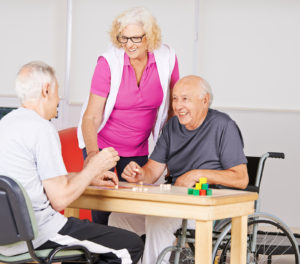6 Ways to Help an Aging Loved One Combat Loneliness
Human beings are social creatures by nature, but our sociability tends to decrease with age. Retirement, lack of mobility, the death of loved ones, and living alone can all lead to feelings of loneliness.
Loneliness is particularly common among older adults, and it can have seriously harmful effects on your loved one’s mental and physical health. According to a 2012 study from the University of California San Francisco, seniors who reported feelings of loneliness had a 59 percent greater risk of physical and mental decline and a 45 percent increase in mortality.
But feeling lonely doesn’t necessarily correlate with living alone. The aforementioned study found that 43 percent of those surveyed reported feeling lonely, but only 18 percent actually lived alone. Whether your loved one lives alone or not, it’s important to understand the risks of loneliness and what actions you can take to combat it.
With these six tips, you can help your aging loved one live a more enjoyable and fulfilling life.
- Keep in touch – often.

As your parent or loved one gets older, you should up the frequency of your communication – both on the phone and in person. You don’t need a special reason to visit your loved one or give them a call. Just make sure regular communication is a part of your routine, especially if they can’t drive, just celebrated a milestone birthday, or recently lost a spouse or close friend. If distance isn’t an issue, visit them in person. Phone calls are nice, but nothing beats physical presence.
- Encourage activity.

Many community centers offer programs for seniors that are great opportunities to socialize, meet new people, and learn new things. Cooking classes, book clubs, scrapbooking, knitting circles, bird watching, pottery classes, and even bingo are great ways for your loved one to be more active and feel connected. Join them for a class or club if they’re feeling apprehensive about trying something new.
Loneliness and isolation often lead to a lack of physical activity. If your loved one is able-bodied, exercise is one of the best things they can do. Swimming, walking, tai chi, and gentle yoga offer the right amount of movement without being too strenuous. They can also be done with a group and can help fend off health conditions like heart disease and diabetes.
Related: 5 In-Home Exercises for the Young at Heart
- Do things together.

Your loved one’s hobbies and interests have likely fallen to the wayside over the years. Get out of the house and get active by going to concerts, movies, museums, plays, sporting events, restaurants, and community gatherings together.
Help them rekindle their interests by doing things together. If your mother was once an expert embroiderer, have her teach you how to do it. If your father used to keep a garden, pot a tomato plant or fresh herbs together.
- Bring the grandkids around.

If you’re caring for an aging parent, encourage one-on-one time with their grandchildren. Grandparents are a source of wisdom. Let them pass their vast knowledge and life experience onto their grandchildren by telling stories and looking through photo albums together. Your parent can also stay involved by attending their grandchildren’s soccer games, dance recitals, and school events.
- Encourage volunteering.

Volunteering for a worthy cause is rewarding at any age, but it has an overwhelmingly positive effect on well-being in seniors. It gives a sense of purpose and accomplishment, provides a feeling of greater satisfaction, and lowers the risk of depression, according to the Corporation for National & Community Service.
Your loved one can put their knowledge, skills, and interests to good use by volunteering in their own community. Encourage your loved one to volunteer with their local historical society, animal shelter, church, assisted living facility, or library. Senior Corps connects older adults with a multitude of volunteer opportunities around the country, including the Foster Grandparent program.
- Adopt a pet.

Adopting a cat or dog from a local animal shelter has an incredibly positive impact on emotional and physical well-being. A newfound sense of responsibility boosts feelings of happiness and self-worth. Keep in mind, an energetic puppy or kitten isn’t the only option. Shelters have many older animals who, in addition to being housetrained, want to enjoy their golden years, too.
Loneliness is a common side effect of growing older, but it’s 100 percent preventable. If you’re caring for an aging loved one, Bluebird Homecare can help. Our caregivers can provide companionship and facilitate a more social lifestyle by transporting your loved one to and from activities in their community.
Contact Bluebird today and learn how we can help you.